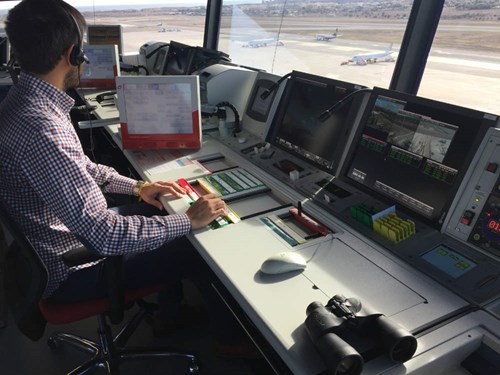DF Nucleo comissions the first VOIP VCCS for AENA in three Spanish Airports: Bilbao, Almeria and Alicante
- Madrid, Spain.
DF Núcleo has commissioned the three first voice communication systems (VCS) in Spain that are fully based on Voice over IP (VoIP) technology. The migration process was carried out on the control towers of three airports of AENA: Alicante-Elche, the fifth largest airport in terms of passenger traffic; Bilbao, the largest airport in the Bay of Biscay; and Almería.
These air traffic control towers - with a traffic of more than 28 million passengers and 150,000 operations every year - have been equipped with the ULISES V5000i VCS, a system that has been fully developed and manufactured by DF Núcleo and adapted to specific requirements of AENA.

ULISES V5000i System
The ULISES V5000i VoIP Voice Communication System can handle the critical ground/air and ground/ground communications of the operators in all air traffic management environments. The system was designed in compliance with the international air traffic control standards and this is the fifth generation of the product, which has been present in the market for almost 40 years.
The ULISES V5000i has not only been installed in these three airports, but also in many other airports in Africa, including its mobile version. Currently, DF Núcleo is working on other projects to upgrade and migrate the VCS to VoIP in another eight Spanish airports: Tenerife Sur, San Sebastián, Santander, Gran Canaria, Vigo, A Coruña, Lanzarote and Palma de Mallorca.
Main features of the system
Optimum solution in terms of return on investment
- Modular design that can be fully adapted to the customer's needs.
- Intensive use of COTS elements and platforms in the system.
- Smart redundancy of radio sets (M+N) for a single frequency.
- Flexible architecture, meaning that the transition occurs without impacting the user.
- Proprietary development of dedicated cards for the interface.
- Guaranteed support over a 10-year period.
Robust design with outstanding performance
- Offering one of the highest availability levels in the market, with Hardware redundancy and hot-pluggable mechanisms.
- Redundant Ethernet network with a virtual IP address.
- The system uses decentralised switching in a fail-safe architecture, creating a unit with no single point of failure.
- Latency, delay and voice quality that achieve a performance above the specifications established in the Eurocae standards.
- Automatic best radio signal selection (BSS)
Migration to VoIP
The Air Traffic Control (ATC) industry is migrating its voice communication technology to VoIP for two main reasons:
- Telecommunication service providers are progressively interrupting the services of dedicated lines.
- Eurocontrol, FAA (Federal Aviation Administration) and other pioneering regulatory bodies have validated the VoIP technology for air traffic control and recommend it.
Benefits of migrating to VoIP
Despite the considerable reduction in the general costs (acquisition, operation and maintenance), VoIP communication systems for ATC are based on a mature technology that meets the operational requirements established by the main bodies of the aviation industry. In addition, they offer an increased reliability, availability and flexibility.




.jpg)

.png)




Comments
There are no comments yet for this item
Join the discussion